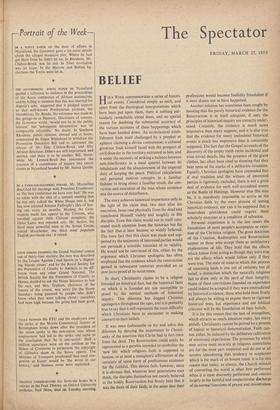BELIEF
HOLY WEEK commemorates a series of histori- cal events. Considered simply as such, and apart from the theological interpretations which have been put upon them, there is nothing par- ticularly remarkable about them, and no special reason for doubting the substantial accuracy of the various accounts of these happenings which have been handed down. An ecclesiastical estab- lishment finds itself challenged by a prophet or agitator claiming a divine commission; a colonial governor finds himself faced with the prospect of civil disorder in the territory entrusted to him, and is under the necessity of striking a balance between non-interference in a local quarrel between its inhabitants and the abandonment of the imperial duty of keeping the peace. Political calculations and personal motives conspire in a familiar fashion to bring about a familiar result, the con- viction and execution of the man whose existence was the source of disturbance.
The story achieves historical importance only in the light of the claim that, two days after his execution, Jesus rose physically from the dead and manifested Himself visibly and tangibly to His disciples. Even this claim would not in itself com- mand much attention from the historian but for the fact that .it later became so widely believed. The mere fact that this claim was made and sup- ported by the testimony of interested parties would not persuade a scientific historian of its validity. He would not be convinced of this, either, by the argument which Christian apologetic has often employed that the credence which the resurrection gained in subsequent centuries provided an ex post facto proof of its occurrence.
In short, Christianity claims to be a religion founded on historical fact, but the historical facts on which it is founded are not susceptible to proof by the normal methods of historical inquiry. This dilemma has dogged Christian apologetics throughout the ages, and it is probably true to say that it still represents the main difficulty which Christians have to encounter in making converts to their beliefs.
It was once fashionable to try and solve this dilemma by denying the importance to Christi- anity of the assertion that Christ had in fact risen from the dead. The Resurrection could easily be represented as a parable intended to symbolise the 'new life' which religious faith is supposed to bestow, or at most a metaphoric affirmation of the certainty of some form of posthumous existence for the faithful. This device fails, however, since it is obvious that, whatever later generations may think, the disciples themselves not merely believed in the bodily Resurrection but firmly held that it was the basis of their faith, in the sense that their professions would become foolishly fraudulent if it were shown not to have happened.
Another solution has sometimes been sought by insisting that the purely historical evidence for the Resurrection is in itself adequate, if only the principles of historical inquiry are correctly under- stood. Certainly, the evidence is much more impressive than many suppose, and it is also true that the evidence for many undoubted historical events is much less impressive than is commonly supposed. The fact that the Gospel accounts of the discovery of the empty tomb recite incidental and even trivial details, like the presence of the grave clothes, has often been cited as showing that they bear none of the marks of a deliberate invention. Equally, Christian apologists have contended that if oral tradition and the witness of interested parties is rigorously excluded, there is not a great deal of evidence for such well-accredited events as the Battle of Hastings. However true this may be, it is manifestly impossible to arrive at the Christian faith by the mere process of testing historical evidence, nor can it be supposed that a benevolent providence could require these scholarly exercises as a condition of salvation.
Personal experience is in the last resort the foundation of most people's acceptance or rejec- tion of the Christian religion. The great doctrines of the Creation, Redemption and Resurrection appear to those who accept them as satisfactory explanations of life. They hold that the effects which follow from acting as though they were true are the effects which would follow only if they were true. The state of mind to which this process of reasoning leads is one not of certainty but of belief, a distinction which the naturally religious fail to draw only at the peril of their integrity. None of these convictions founded on experience could indeed be accepted if they were contradicted by historical evidence; those who hold them firmly will always be willing to expose them to rigorous historical tests, but experience and not biblical criticism will be the foundation of their beliefs.
It is for this reason that the task of evangelism, which attracts so much attention today, has many pitfalls. Christianity cannot be proved by a process of logical or historical demonstration. Faith can- not, either, be induced by the deliberate cultivation of emotional experiences. The processes by which men arrive most securely at religious convictions are for the most part empirical and do not at all involve abandoning that tendency to scepticism which is the mark of an honest mind. It is for this reason that today, as always, the Church mission of converting the world is often best performed when it is most discreetly performed and consists largely in the faithful and unspectacular discharge of its normal functions of prayer and ministration.






































 Previous page
Previous page